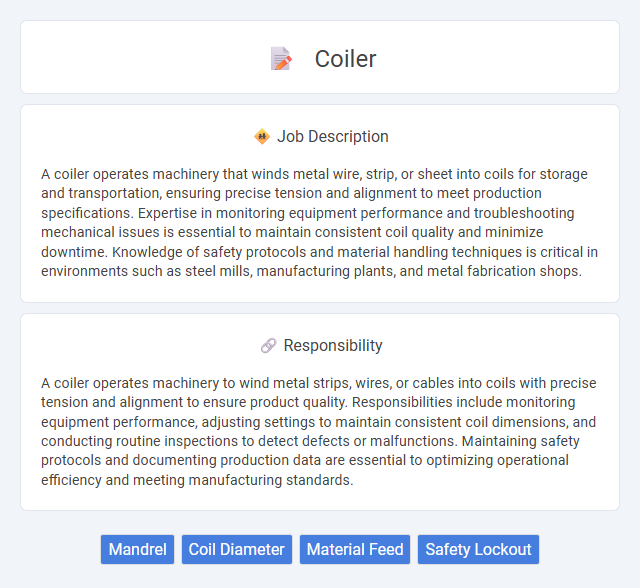
A coiler operates machinery that winds metal wire, strip, or sheet into coils for storage and transportation, ensuring precise tension and alignment to meet production specifications. Expertise in monitoring equipment performance and troubleshooting mechanical issues is essential to maintain consistent coil quality and minimize downtime. Knowledge of safety protocols and material handling techniques is critical in environments such as steel mills, manufacturing plants, and metal fabrication shops.
Individuals with good physical stamina and manual dexterity are likely suitable for a coiler job, as it often involves repetitive motion and handling heavy materials. Those prone to fatigue or with limited strength might find the role challenging and less compatible with their physical abilities. It is probable that candidates with a strong attention to detail and ability to work in potentially noisy or industrial environments will perform better in this position.
Qualification
A Coiler operator must possess technical skills in handling and maintaining coiling machines, with a strong understanding of metal coil specifications and production processes. Proficiency in reading blueprints and mechanical drawings is essential, along with experience in quality control to ensure product accuracy. Candidates typically require a high school diploma or equivalent, combined with hands-on training or certification in manufacturing or industrial operations.
Responsibility
A coiler operates machinery to wind metal strips, wires, or cables into coils with precise tension and alignment to ensure product quality. Responsibilities include monitoring equipment performance, adjusting settings to maintain consistent coil dimensions, and conducting routine inspections to detect defects or malfunctions. Maintaining safety protocols and documenting production data are essential to optimizing operational efficiency and meeting manufacturing standards.
Benefit
A coiler job likely offers benefits such as improved manual dexterity and technical skills gained through handling various machinery and materials. There is a probability of significant physical conditioning due to the active and hands-on nature of the work. Job stability may also be present in industries relying on continuous production processes involving coiling tasks.
Challenge
Working as a coiler likely involves managing heavy machinery and materials, which can present significant physical and technical challenges. The role probably demands precision and attention to detail to ensure coils are wound correctly and meet quality standards. Problems with equipment malfunction or inconsistent material quality might often require quick problem-solving and adaptability.
Career Advancement
Coiler operators play a critical role in manufacturing by precisely winding metal coils for steel, aluminum, or copper products, requiring technical expertise and attention to detail. Advancing in a coiler job often involves gaining proficiency in automated machinery, quality control procedures, and safety standards, leading to higher responsibilities such as shift supervisor or maintenance technician roles. Career growth opportunities expand further with certifications in industrial operations or manufacturing technology, enabling transitions into production management or engineering support positions.
Key Terms
Mandrel
A coiler operator working with a mandrel must ensure precise control of the mandrel's tension and rotation to tightly coil metal strips or wires without causing deformation. The mandrel's diameter directly impacts the coil's inner diameter, making it essential for producing coils that meet exact industry specifications. Mastery of mandrel adjustments and maintenance prevents material damage and enhances overall production efficiency in metal forming processes.
Coil Diameter
A coiler operator expertly controls the coil diameter to ensure precise winding and maintain product quality in metal processing. Consistent coil diameter directly impacts material handling efficiency, storage, and transportation costs. Advanced coiling machines use real-time measurements to adjust tension and speed, optimizing the final coil diameter according to industry standards.
Material Feed
The coiler operator plays a crucial role in managing the material feed process, ensuring continuous and precise delivery of metal strips or sheets into the coiling machine. Efficient material feed reduces downtime and maintains product quality by preventing material tension variations and misalignment during coiling. Advanced sensors and automated feed control systems enhance the consistency and speed of material handling in metal fabrication industries.
Safety Lockout
A Coiler operator must adhere strictly to Safety Lockout procedures to prevent accidental machine startups during maintenance or adjustments. Effective implementation of lockout-tagout (LOTO) protocols ensures that energy sources are fully isolated, minimizing the risk of injury. Regular training and compliance with OSHA standards are critical for maintaining a safe working environment in coiling operations.
 kuljobs.com
kuljobs.com